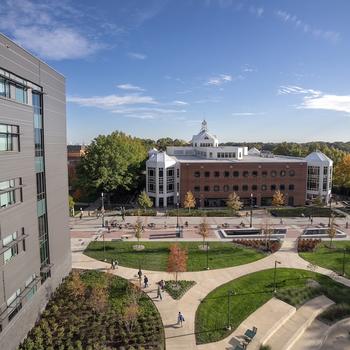Mason in top 25 in social, computer, and information science research funding

George Mason University’s $230 million in research funding in fiscal year 2022 was a 7% increase from 2021, putting the university three years ahead of its goal of $225 million by 2025.
The latest figures released by the National Science Foundation (NSF) show Mason’s research funding in the top 25 nationally in the areas of:
- Social sciences: 10th among all universities (best in the Washington, D.C., area) and seventh among public universities.
- Computer and informational science: 21st among all universities and 13th among public universities in federally funded research.
- Engineering continued its impressive gains by moving up five places to 73rd nationally among all universities (rising 69 places since 2018), and advancing four spots to No. 52 among public institutions.
Overall, Mason’s research and development funding was 75th among public institutions and 60th among public institutions without medical schools.
“These rankings are a testament to the commitment of our remarkable social sciences faculty to lead impactful research that drives action that addresses the interconnected needs and priorities of our regional, national, and global communities,” Ann Ardis, dean of the College of Humanities and Social Sciences (CHSS), said.
Added Ken Ball, dean of the College of Engineering and Computing (CEC): “The groundbreaking work in our college demonstrates our continued strength and substantial contribution to Mason’s overall research portfolio. For decades, Mason has proudly and consistently been a national leader in computer science. I’m proud that our research has lasting impacts across society.”
Some of the long-term projects either funded or ongoing in FY 2022 that have positioned Mason as a leader in research of consequence include:
- An interdisciplinary team from CEC and the College of Science (COS) studying underwater explosions and their effects on civil engineering infrastructure.
- A study on health equity and the impact of Medicaid telehealth policy from the CHSS and the College of Public Health.
- Research in machine learning, cloud security, and hardware security led by CEC assistant professor Khaled N. Khasawneh.
- Helping military personnel fight hemorrhagic diseases through research led by COS professor Aarthi Narayanan.
- Identifying natural mechanisms to boost the immune process through research by COS associate professor Ramin Hakami.
- Brain research by the CEC professor Giorgio Ascoli.
- The researchers are from Mason’s Center for Ocean Land Atmospheric Studies updating the National Oceanic and Atmospheric Administration’s drought forecasting system.
- Establishing the Virginia Climate Center, an effort is led by faculty from the COS, CEC, and CHSS.
- A team from the Center for Evidence-Based Crime Policy working to enhance research and practice in police encounters of individuals in mental health crisis.
Funding for the Virginia Climate Center was made possible through the efforts of Congressman Gerry Connolly (VA-11). Virginia Senators Mark Warner and Tim Kaine were the primary sponsors of the project to help police in encounters with individuals in mental health crisis.
In the social sciences, which includes CHSS, the College of Public Health, the Jimmy and Rosalynn Carter School for Peace and Conflict Resolution, the Schar School of Policy and Government, the College of Education and Human Development (CEHD), and the Donald G. Costello College of Business, initiatives came in several forms.
"The Schar School is a proud contributor to Mason's social science research drawing from a deep pool of esteemed scholars and rising stars engaged in cutting edge interdisciplinary and disciplinary research," said Schar School Dean Mark J. Rozell.
Some examples:
- Examining the human response to climate change during the last glacial period with CHSS’s Jamie Clark leading an international team.
- Translating research into actionable guidelines to help probation officers support their clients to achieve better outcomes, a collaboration between the College of Public Health and the Schar School.
- Exploring the intricacies and prevalence of the illicit trafficking of human kidneys. Headed by the Schar School with input from the CEC’s Systems Engineering and Operations Research Department.
- Identifying ways to use human-robot teaming to open the field of construction to neurodiverse individuals, specifically those with attention deficit disorder and attention deficit/hyperactivity disorder. Teams are from the Schar School, CEC, and CEHD.
- Examining whether school safety and security measures have negative, academic, behavioral, and social effects on low-income students and students of color. The effort is led by CEHD.
- A team from the Schar School, led by Louise Shelley and CEC’s Edward Huang, is investigating how to disrupt illicit supply chains and influence policy.
- Researchers in the College of Public Health and CEC are developing a machine learning approach to accurately identify the age of bruises.
- Creating an interprofessional Learning Laboratory for Community Health that trains students to serve and improve health care for underserved communities. Led by professor of nursing Rebecca Sutter, the effort includes faculty from the College of Public Health and the Costello College of Business.
- Developing accessible and culturally appropriate communications of new scientific findings to communities most affected by the opioid crisis. The research is led by Schar’s Faye Taxman and CHSS’s Xiaoquon Zhao.
The NSF collected its data from 900 universities in the Higher Education Research and Development (HERD) Survey, sponsored by the NSF’s National Center for Science and Engineering Statistics unit.
Latest News
- April 25, 2024
- April 24, 2024
- April 22, 2024
- April 22, 2024
- April 19, 2024

